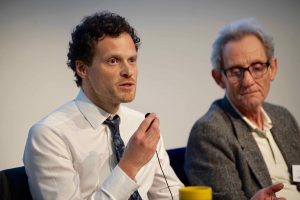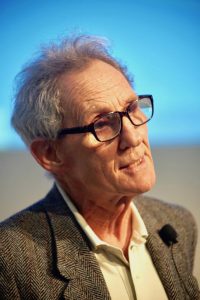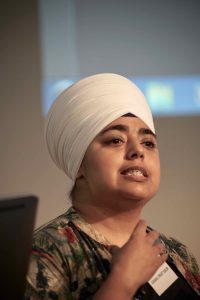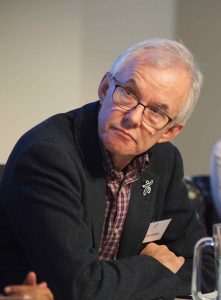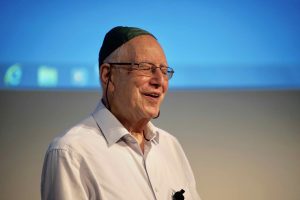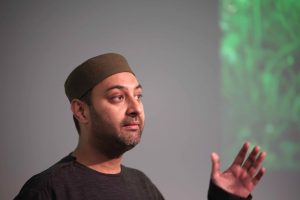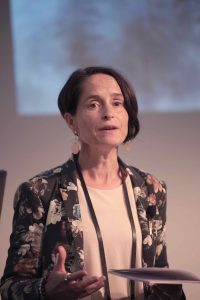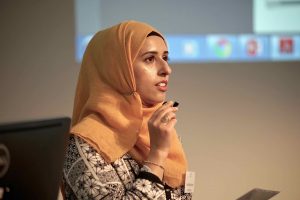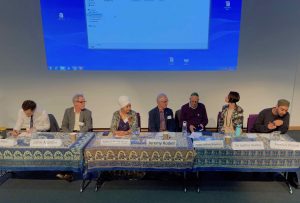SEEFF Annual Conference “Twelve Years to Save the Planet?”
held on Monday 16th September 2019
At the University of Surrey Lecture Theatre at Rik Medlik Building
South East England Faith Forum’s 2019 Annual Conference examined faith, belief and non-faith perspectives on climate change, and the influence and impact that faith and non-faith groups can and should have on the future of our planet.
The Conference opened by the SEEFF Chair Kauser Akhtar. Kauser invited the audience to a few minutes of silence to remember Charles Wallach, the Jewish member of SEEFF Board of Directors.
Following Kauser, Rabbi Alex Goldberg, the Jewish Chaplain to the University of Surrey, barrister and human rights activist welcomed the guests.
John Paul De Quay
The first speaker, John Paul runs Ecological Conversion Group, which aims to educate schools and parishes on ecological crisis and how to respond, putting faith into practice through living the ecological conversion. The Group works alongside the Catholic Bishop’s conference of England and Wales.
John Paul talked about a long letter called “LAUDATO SI’, mi’ Signore” – “Praise be to you, my Lord” by Pope Francis. He said that the paper has the subtitle “on care for our common home” where the Pope critiques consumerism and irresponsible development, laments environmental degradation and global warming, and calls all people of the world to take “swift and unified global action.” The paper also talks about “Integral ecology”, which we are part of and linked through many things; the earth is our home and it is looking more filth by day.
John Paul also mentioned Wendell Berry, a farmer and environmental activist. His farm is a self-sustaining economic enterprise that reinforced familial bonds and human obligations to the natural environment.
Paul listed the symptoms and the cause of inequality. The symptoms were listed as hunger, refugees, waste, slavery, armed conflict, climate change, mass extinction. The Causes were listed as greed, wilful ignorance, wasteful culture, convenience. Saying that we know what is happening, he asked why we don’t show mercy as in The Good Samaritan as it is the Christian responsibility to act.
Paul mentioned CS Lewis and his idea of relativity, objective truth who argued for objective truth and morality against the relativism of his (and our) day. He felt that establishing the reality of truth and goodness was an essential preparation for the Gospel.
Paul also mentioned Martin Luther King’s quote from Matthew: “Blessed are the peacemakers: Blessed are the peacemakers, for they will be called sons of God.”
John Marder
John Marder, Interfaith Officer for Network of Buddhist Organisations UK, has worked all his life in horticultural education and green space management, and is currently the Horticulture and Landscape Officer at Horsham Council and a Professional Associate of the RHS. He is a lifelong Buddhist practitioner, Interfaith Officer for the NBO and active in the Crawley Interfaith Network.
John talked about the importance of pure land in Buddhism and the cultivating Buddha nature. He mentioned Nichiren belief, a 13th century Buddhist in Japan, that talks about pure mind and pure nature. He stressed the importance of enjoying the protection and support of the world around us and quoted Nichiren: “If the minds of living beings are impure, their land is also impure, but if their minds are pure, so is their land. There are not two lands, pure or impure in themselves. The difference lies solely in the good or evil of our minds.” Thus our actions which must be mindful are critical.
John stressed that Buddhists believe that you don’t harm, you don’t kill, thus most Buddhists are vegetarian, and in recent years, the number of vegans increased too.
He concluded that technical solutions create more technical problems. So we need to recognise our collective responsibilities, simplify our lives, influence others to do the same.
Kamal Preet Kaur
Kamal Preet Kaur, who has a triple MA in media, film communication and comparative study of World Religions, is an experienced community journalist and radio and TV presenter. She works with young people and women within the Sikh community to promote their representation in their chosen fields. She has special interest in inter-faith and community relations. She is a representative of the Sikh Missionary Society UK.
Kamal talked about the Sikh perspective on climate change. Sikhs believe One Universal Omniscient creator, the Lord; God is everything, there is nothing but God. They believe in Karta-purakh “He is imminent in the cosmic form”, all is holy, and earth’s gift cannot be consumed for selfish reasons.
Kamal said Sikh way of life is ecosophical, where all is holy and is regarded with respect. There is One Almighty Omniscient God, who resides in Matter and Spirit. She said, the faith showed a way to live a life of consciousness as Karta Purakh, the Creator-Dweller, had fashioned Earth as a place to practice Dharam (righteousness), being mindful at all times of what we take from Mother Earth and what we return.
Dharam Khand is based on the law of cause and effect, that means we reap what we sow. Dharam teaches how to live responsible lives if we are to be saved from total disorder leading to chaos and destruction. The earth’s survival depends on the observance of dharam in all relationships.
Conscious living is truthful living, meditation and sharing; Conscious of the cosmic interconnection; Conscious of ones’ actions and consequences; Conscious of receiving and giving back; Conscious of transience and mortality.
However, in our day, eating, drinking, laughing and sleeping, the mortal forgets about dying.
Some young Sikh people are taking Sewa – selfless service further and planting a million trees.
Other ecological movements Kamal mentioned are Eco Sikhs, Eco Baba, Green Gurdwaras and Guru Nanak sacred forests.
Kamal concluded that these movements indicate that it is not an end, but a new beginning!
Jeremy Rodell
Jeremy Rodell, Dialogue Officer for Humanists UK, has a particular interest in the major changes taking place in the British religion and belief landscape, and the role of open and constructive interactions between people with humanist and religious worldviews.
Jeremy began by recognising that this is one of many topics where there is little difference between many religious and non-religious people.
Humanists generally think science is the best way to understand facts about the world, including on climate change, and he referred to Humanists International’s recent ‘Reykjavik Declaration on the Climate Change Crisis’. Most humanists also think that morality has been created by humans based on our shared humanity as social animals, which is why they, and societies with widely differing religions and beliefs, agree on the Golden Rule: treat others the way you would like to be treated if you were them. Suffering is bad, flourishing is good.
Applying that to ’12 years to save the planet?’: we should be humble. The Earth has existed for 4.5 billion years. If its history were a 24 hour clock, all of human history and prehistory would occupy only the final 1 minute, 17 seconds. The planet and life will go on. But climate change is likely to cause massive suffering.
It is entangled with other serious issues, including deforestation, loss of biodiversity, water shortages, soil erosion and degradation, and pollution. Almost all of these are made worse by growth in the human population.
In broad terms, we know what needs to be done, and the urgency. The challenge is the political will – including whether democracy can deliver it – made worse by the ‘post-truth’ denial of inconvenient facts. Individual enthusiasm is essential, but not enough. Only governments and international bodies can make a real difference. And this is where both religious and non-religious people and organisations can bring their influence to bear, both on both politicians and society.
Rabbi Jeffrey Newman
Rabbi Jeffrey Newman, Founder of Shema, a new Jewish cross-denominational climate action & justice, environmental and sustainability network. Emeritus Rabbi of Finchley Reform Synagogue, he is also very involved with Extinction Rebellion and author of an article on Jews, non-violence and civil disobedience in a forthcoming Penguin publication.
Rabbi Newman asked for a moment of contemplation to remember Charles Wallach.
Then asked the question: “How does what you heard make you feel; grief, anger, despair, sadness for future generations – our grandchildren?”
Rabbi Newman stressed that we all have individual responsibilities. Then talked about Extinction Rebellion – a socio-political movement with the stated aim of using civil disobedience and nonviolent resistance to compel government action on climate breakdown, biodiversity loss, and the risk of social and ecological collapse.
He then talked about Deep Adaptation, a concept created by Jem Bendell; it is a framework that works as a tool for people to explore all possible implications at a personal and collective level. He said: “if we believe in something we cannot do, but we can, people can come together to share their despair, darkness, valley of despair; people come out more determined to act!”
Bryan Puszkar, representing the Scottish and Southern Electricity Network gave a brief message on how we can work together in using the energy in a more efficient way as the way we use, generate electricity is more important.
Kamran Shezad
Kamran Shezad, a Chartered Environmentalist with practical field and managerial experience in sustainable development extending over 17 years. He is the Director of Training for the Islamic Foundation for Environmental and Ecological Sciences (IFEES) and Sustainability Lead for the Bahu Trust (22 mosques around the UK). Kamran is also a full member of the Institute for Environmental Management & Assessment (IEMA).
Kamran gave a brief introduction to Islam and the environment. Saying that there are two billion Muslims in the world, he stated that all faiths are united with similar approaches. Then he talked about four Islamic principles on environment:
Tawhid – the unity principle
Fitrah – the Creation principle
Mizan -the balance principle
Khalifah – responsibility/stewardship
Kamran quoting a verse from the Qur’an said, the rest of creation is greater than us: “Surely the creation of the heavens and the earth is greater than the creation of man; but most people know not” (Qur’an 40:57) and yet, God has made it subservient to us. “Do you not see that Allah (Almighty) has made what is in the Heaven and Earth subservient to you and made complete to you His favours outwardly and inwardly?” (Quran 31:20) It is therefore our duty to take care of it.
He gave them example of a tree, and asked how we benefit from it. Just to quote a few benefits: provides oxygen, conserves energy, provides food, provides wood, heals, helps to mark seasons, habitat for wildlife, and cleans the air and countless other benefits.
Corruption has appeared in both land and sea as a result of people’s actions, the consequences of which they may taste, so that hopefully they will turn back. (Qur’an, 30:41)
He then talked about the importance of protecting nature in Islam. He said that we can only act together as one global community; then we can make the difference. Saying that our planet is suffering and needs us to restore the natural balance, he stressed the need for us as people from different faiths and beliefs to bring this message to the world. He concluded: “Let us save the planet first, then we can sit down and debate about God!”
Dr Justine Huxley
Dr Justine Huxley, the CEO of St Ethelburga’s and leads on vision and strategy. She has developed programme strands at St Ethelburga’s that include Deep Adaptation (a faith response to climate breakdown); spiritual ecology (an interfaith and inter spiritual approach to ecological action) and Refugee Allies (interfaith action for displaced peoples). Justine is relentlessly passionate about building a world rooted in compassion and our interdependence with each other and with Earth. A focus of her work includes advancing the next generation of leaders and peace-makers and building resilience for a dystopian future. Her first book, Generation Y, Spirituality and Social Change is a collection of interviews with young adults living a radical new vision of faith and action. Justine has a PhD in psychology and previously worked in the business world.
Justine talked about Spiritual Ecology: “The Systems of denial of the ecological tragedy we are approaching is bad, but we can still manage it. There is still time if we act in time.” For this, she said, there is the need for building greater resilience in community influencers and faith leaders. She reiterated the importance of preparing the individuals and communities by mapping the trajectory of different aspects of potential collapse (such as food shortages and escalating extremism) and making practical action plans to strengthen local community relationships. Mentioning Prof Bendell’s paper “Deep Adaptation”, she said that as the challenges get more frequent and intense, engaging with a process of ‘deep adaptation’ gains more importance.
Justine said that this information should allow four R’s: Relinquishment, Reconciliation, Resilience, Restoration. She stressed the triple injustice of climate breakdown:
Poorest first and worst; Those most affected didn’t cause it; Those responsible aren’t paying it
She then asked where do we make meaning? “If climate breakdown was to be our biggest teacher, what do we stand to learn?”
She then concluded: “As people of faith, we have resources of meaning; we have the power and strength to do that! When things fall apart, we find out what is important, our dependence of nature, God. Through collapse, we learn strength!”
Kauser Akhtar invited attendees to write their questions over lunch, which were then addressed in the afternoon session after the AGM.

